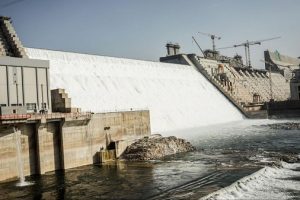
Last week, the Russia-Africa Summit was high on the agenda of international limelight and drew significant media attention with the former rolling out the red carpet for African delegations. In spite of the ado, the summit has been a moment of amicability and comradery between the two sides and beyond. The leaders’ hands were full in dealing with bilateral and multilateral concerns of regional and global affairs.
The much anticipated two-day summit, that brought dozens of African representatives together, has already sent a strong signal that the time to leave Africa behind is no longer possible while attesting to the growing desire of global power to cultivate elevated relations with the continent.
In fact, over the years, developed nations taking the mammoth potential of the continent into consideration have been reconsidering their policy and increasing their appetite to engage with one of the biggest and most populous continents of the world.
As the world continues to go through a dynamic transformation with new blocs formed and alliances redefined, the menu for cooperation has included new lists of alternative cooperation. From Sino Africa Summit to TICAD and US Africa Forum, more nations have been keen to forge strong alliances with the growing continent.
And, the Russia-Africa Summit serves as a big testimony to the increasing role of the continent in the global arena. Of course, Russia’s engagement with Africa dates back to the Soviet Union era when the country provided support to African countries in their struggle for independence. In recent years, Russia has revitalized its focus on Africa, recognizing the immense potential for mutually beneficial cooperation in various sectors.
A couple of years ago, Russia in an effort to step up its ties with Africa also launched Russia Africa Forum.
The first forum which was aimed at boosting the economic and political relations of the two sides was held in Sochi, Russia in 2019. And last week, the Russian city of St. Petersburg hosted the Second Summit Russia–Africa Economic and Humanitarian Forum, a two-day gathering aimed at strengthening ties between Russia and the African continent.
The forum, which was attended by 49 African delegations and 17 heads of state, provided valuable insights into Russia’s perspective on its relationship with Africa and its goals for deepening trade, economic, and humanitarian cooperation with African countries.
Speaking at the opening ceremony, Russian President Vladimir Putin emphasized his country’s resolve to support African countries while noting that Russia has been a reliable partner for Africa, providing assistance in areas such as agriculture, energy, and education.
He highlighted the importance of developing economic ties between Russia and Africa as he stressed the need to increase trade and investment between the two parties. He noted that while progress has been made in these areas, there is still significant room for collaboration, particularly in the fields of energy, agriculture, and industrial development.
Regarding cooperation and expertise, he stated that Russian companies can offer African countries the potential for cooperation in oil, gas, and nuclear energy. Putin also mentioned the importance of developing cooperation in manufacturing, ICT, transport, and logistics.
President Putin also indicated Russia’s commitment to help Africa overcome its challenges of food security signaling that the former is a significant exporter of agricultural products and willing to share its expertise and technology.
He also discussed Russia’s ability to provide humanitarian aid to Africa, particularly during times of crisis, and its determination to support the continent’s effort to address the impacts of climate change.
Regarding the current state of Russia-Africa relations, President Putin also acknowledged that there are still some obstacles to overcome, such as the impact of Western sanctions on Russia’s economy and the challenges of transportation and logistics in Africa. He expressed Russia’s willingness to work with African countries to find solutions to these challenges and strengthen economic ties between the two regions.
In addition, President Putin emphasized the importance of increasing cultural, scientific, educational, sports, and youth exchanges between Russia and Africa. He noted that Russia is committed to training African professionals in various fields, including agriculture, industry, and energy.
He expressed the value of cultural, scientific, educational, sports, and youth exchanges between Russia and Africa indicating that nearly 35,000 African students are studying in Russia. He proposed the possibility of opening schools in Africa that teach the Russian language and invited African countries to join the international Russian language organization.
He also touched on cooperation in healthcare and the fight against epidemics, noting that Moscow has been assisting African countries in countering infections and has developed a large program to support Africa in this area until 2026.
It was learned that Russia called off 23 billion dollars in African debt. On the sidelines of the forum, African countries seized the opportunity to enter agreements with different Russian offices. Also, African countries called on Russia to ensure the safe transportation of grain and foodstuffs.
“We are not turning a blind eye to that because we have good relations with both countries. We are seeing negative consequences that are reverberating around the world, including Africa. So, we are here to try to find some solution that can satisfy both Russia, a fraternal country, and also the African continent, said the Chairperson of the African Union, President of the Comoros Azali Assoumani.
Putin had earlier announced that 25,000 to 50,000 tons of grain would be given to six African countries for free such as Burkina Faso, Zimbabwe, Mali, Somalia, Eritrea, and the Central African Republic. However, the amount of grain promised by Putin is too small compared to the 725,000 tons of grain that the United Nations World Food Program bought and distributed to countries facing famine.
The Forum which is held biennially brings together leaders from Russia and Africa to discuss and address key challenges and opportunities. The forum facilitates constructive dialogue on a range of issues, including energy, infrastructure, agriculture, healthcare, and education. It aims to identify areas of collaboration and develop concrete action plans to promote sustainable development.
BY EYUEL KIFLU
THE ETHIOPIAN HERALD THURSDAY 3 AUGUST 2023



